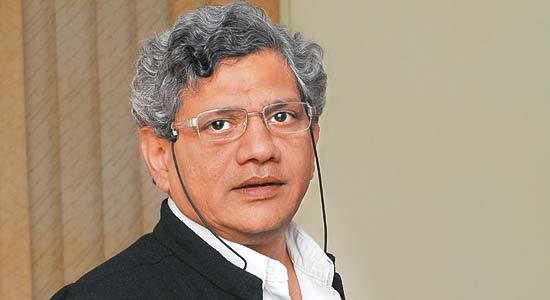Marxism is not a dogma but a ‘creative science’. It is based on, amongst others, “a concrete analysis of concrete conditions”. Marxism is an approach to the analysis of history in general, and of capitalism, in particular, said Sitaram Yechury, at London. Here’s an abridged version of the address of the author, the general secretary of the CPI(M) at “Marx 200” Conference in London on Saturday (May 5), on the occasion of the bicentennial celebrations of Karl Marx, for Different Truths.
Marxism is unique in the sense that it can be transcended only when its agenda is realised; the agenda of realising a classless Communist social order. Specifically, under capitalism, its understanding of capitalism is alone thorough enough for it to comprehend the historical possibilities that lie beyond it. Hence Marxism can never be, under capitalism, rendered superfluous until capitalism is itself superseded. Post-capitalism, Marxist philosophy and worldview will continue to be the basis and the scientific guide, for socialist construction and the transition to Communism.
Marxism is not a dogma but a ‘creative science’. It is based on, amongst others, “a concrete analysis of concrete conditions”. Marxism is an approach to the analysis of history in general, and of capitalism in particular. It is on this basis, building on the foundation provided by Marx that we continuously enrich our theory for understanding the present conjuncture and the possibilities it holds for the future. Far from being a closed theoretical system, Marxism represents a process of continuous theoretical enrichment.
It is precisely due to this – `a creative science’ – that Marxism alone is capable of identifying the tendencies and direction of developments which are the consequences of the perennial human-nature dialectic, encompassing all areas of human endeavour. Every single scientific discovery and development – from astrophysics to nanotechnology – resoundingly validates dialectical materialism. Marxism alone is able to anticipate and equip us to deal with situations that arise when artificial intelligence threatens to take over and control our lives.
Currently, nearly a decade after the global financial meltdown, neo-liberalism itself is in a crisis.
It has by now become clear to a large number of people, particularly in the developed capitalist countries, that the rise of neo-liberalism, which in a sense was preceded by the rise of Reagan and Thatcher in US and UK, had created conditions whereby the bulk of the economic development and growth has been garnered by the minuscule minority leaving greater misery for the vast majority of the people. In the first two-and-a-half post-Second World War decades, global capitalism saw a dynamic period of growth often referred to as the Golden Age of Capitalism. In the USA, in the period 1948 to 1972, every section of the American population experienced an increase in the standard of living. However, between 1972 and 2013 the bottom 10 percent experienced fall in real incomes while the top 10 percent did excessively well.
This crisis of neo-liberalism has created new contradictions leading to ruptures, conflicts amongst imperialist countries, such as Brexit. The emergence of new political forces and rising tensions are the order of the day. The current period is witnessing a further political rightward shift in many parts of the world. In the face of the current crisis, imperialism pursues aggressive neo-liberalism combined with a global divisive agenda fostering domestic, local and regional tensions. It engages in military interventions to consolidate its global hegemony and control of economic resources, like oil in West Asia. This engenders the growth of racism, xenophobia and extreme rightwing neo-fascist tendencies. The triumph of Donald Trump in the US elections, the right-wing mobilisation in the Brexit vote in Britain, the electoral gains of Marine Le Pen of the extreme right National Front in France, the advance of the Alternative for Deutschland in Germany, the formation of a rightwing government in Austria which includes the extreme right Freedom Party, and representation of nearly a third of the European Parliament MPs from rightwing and extreme rightwing political parties are a reflection of this rightward shift. This tendency has also its consequent reflection in Indian politics.
In times of intense global economic crisis, a political battle over who would marshal the rising popular discontent surfaces. The political right-wing advances by rallying popular discontent and in ensuring that the Left and progressive forces do not emerge as a major political force. These right-wing forces capitalising on people’s discontent end up pursuing precisely those very economic policies that have led to this economic crisis imposed unprecedented burdens on the people and caused the rise in popular discontent, in the first place. It is clear that in the coming days, the political direction in many of the countries of the world will be determined by the political success in marshalling popular discontent between the Left-oriented democratic forces and the political right. Fascism arose with the support of the world’s monopoly capital in the wake of the Great Depression of 1929-30. Fascist forces were able to successfully exploit the growing popular discontent amongst the people as a consequence of the crisis. In the current conjuncture, the rising popular discontent against the prolonged economic crisis is fuelling the rise of extreme right and neo-fascist forces.
The socialist ideal remains in today’s conditions of global capitalist crisis the only manner in which humanity can emancipate itself from exploitation. Since the 2008 global financial meltdown, global capitalism has plunged from one crisis into another. Every effort to overcome the crisis has laid the seeds of a deeper crisis. It has become increasingly clear – with the unprecedented economic burdens imposed through intensified capitalist exploitation on the people, consequent sharply widening economic inequalities and the immiserisation of vast sections of the global population – that the predatory nature of capitalism has assumed a more naked form. No amount of reforms within capitalism can liberate humanity from the clutches of such exploitation. It is only the political alternative of socialism that can achieve this purpose. The assault on the rule of capital by this political alternative of socialism has to be intensified for eventual human liberation from exploitation.
Capitalism never collapses automatically whatever may be the intensity of the crisis. Unless a political alternative develops to challenge capitalism, capitalism invariably survives by intensifying human exploitation. Hence, the strength of the socialist political alternative has to vastly grow. While there are growing struggles all across the globe against the current predatory expression of capitalist plunder and the accompanied imperialist hegemonic aggressiveness, these popular mobilisations continue to remain essentially defensive. Defensive in the sense that people are in the midst of struggles to defend their existing democratic rights and livelihood conditions. It is such struggles that must accumulate to reach the levels of mounting the class assault against the rule of capital.
Capitalism, therefore, requires being overthrown which decisively depends on the strengthening of that material force in society led by the working class which can mount, through popular struggles, the intensification of the class struggle to launch the political offensive against the rule of capital. The building of this material force and its strength is the ‘subjective factor’, the strengthening of which is the essential imperative. The objective factor – the concrete situation of the crisis – however conducive it may be for a revolutionary advance, cannot be transformed into a revolutionary assault against the rule of capital without the strengthening of this ‘subjective factor’.
Various intermediary slogans, measures and tactics will have to be employed by the working class, based on a concrete analysis of concrete conditions in each country, to sharpen class struggles and to meet the challenges of these real conditions in order to strengthen the ‘subjective factor’ and, thus, advance the process of revolutionary transformation in their respective countries. Political correlation of forces amongst the people must shift in favour of the Left. This will happen only through the unleashing of militant popular struggles on the basis of an alternative policy framework against neo-liberalism. In the absence of this, it is the political right which consolidates popular discontent in its favour.
Marxism alone today provides the ideological foundations and the theoretical underpinning for strengthening the `subjective factor’ and, thus, sharpening class struggles. Marxism, therefore, remains and shall remain, as long as capitalism is not superseded, the only potent force for changing the real world today. For changing this world for the better, to end the exploitation of humans by humans and nations by nations.
Sitaram Yechury
©IPA Service
Photo from the Internet





 By
By
 By
By
 By
By
 By
By